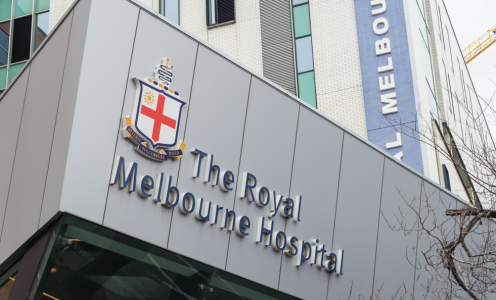Tragic Outcome: How a Post-Colonoscopy Blunder at the Royal Melbourne Hospital Led to a Man's Untimely Death! Protect Yourself from Medical Missteps!
By
Gian T
- Replies 8
The loss of a loved one is always a heart-wrenching experience, but when that loss could have been prevented, the pain is compounded by frustration and a sense of injustice. This was the tragic case for the family of Alan Edward Stewart, a 70-year-old man whose life was cut short due to a series of medical missteps following a routine colonoscopy at the Royal Melbourne Hospital in 2018.
Alan Stewart's story is a cautionary tale for all of us, especially as we age and become more reliant on medical services and advice. After returning an abnormal bowel cancer screening test, Mr Stewart underwent a colonoscopy, a common procedure that many over 60s might be familiar with. The procedure itself is typically quick, lasting about 20 minutes, and patients are usually discharged a few hours later, as was Mr Stewart.
However, the events that unfolded the next day highlight the critical importance of post-procedure care and the need for clear, accurate medical advice. At around 10:44 pm, Mr Stewart began experiencing alarming symptoms: abdominal pain, dizziness, and shortness of breath. His wife, Sherrilyn, did what any concerned spouse would do—she called the hospital seeking guidance.
The call was transferred to the Nurse-on-Call service, a telehealth line meant to provide expert advice. Despite detailing her husband's symptoms, the advice given was tragically inadequate. The nurse suggested Mr Stewart maintain hydration, take Panadol for the pain, and see a doctor within the next 12 hours. This advice, as we now know, was fatally incorrect.
Mr Stewart took the Panadol and went to bed, but by 3:15 am, he was found unresponsive by his wife. An autopsy later confirmed that he had died from a ruptured spleen—a condition that, had he received the right advice and immediate medical attention, might not have been fatal.
The coroner's report pointed to the nurse's incorrect advice as a critical factor in Mr Stewart not receiving the emergency care that could have saved his life. Coroner Paul Lawrie stated, 'Assessment and care may, subject to his clinical presentation on arrival at the hospital, have prevented his death.'
While no recommendations were made to Medibank Health Solutions Telehealth, which provides the Nurse-on-Call service, due to an internal review and subsequent changes, the coroner did make two recommendations to the Royal Melbourne Hospital. These included a review of the written patient discharge information to clarify what constitutes serious symptoms, particularly signs of significant internal hemorrhage, and to ensure a record is kept of all information provided to the patient upon discharge.
This heartbreaking incident serves as a stark reminder of the importance of clear communication between healthcare providers and patients, especially when it comes to understanding post-procedure symptoms and when to seek urgent care. It also underscores the need for vigilance on the part of patients and caregivers.
For our readers, the Seniors Discount Club urges you to always ask questions if you're unsure about the medical advice you're given, especially after a procedure. Ensure you have a clear understanding of potential complications and symptoms that warrant immediate medical attention. If you're ever in doubt, err on the side of caution and seek a second opinion or head to the emergency department.
 We extend our deepest sympathies to Mr Stewart's family and hope that sharing his story will help prevent similar tragedies in the future. Have you or a loved one ever experienced a situation where the medical advice given was not up to par? How did you handle it, and what advice would you give to others? Share your experiences and thoughts in the comments below to help others navigate these challenging situations.
We extend our deepest sympathies to Mr Stewart's family and hope that sharing his story will help prevent similar tragedies in the future. Have you or a loved one ever experienced a situation where the medical advice given was not up to par? How did you handle it, and what advice would you give to others? Share your experiences and thoughts in the comments below to help others navigate these challenging situations.
Alan Stewart's story is a cautionary tale for all of us, especially as we age and become more reliant on medical services and advice. After returning an abnormal bowel cancer screening test, Mr Stewart underwent a colonoscopy, a common procedure that many over 60s might be familiar with. The procedure itself is typically quick, lasting about 20 minutes, and patients are usually discharged a few hours later, as was Mr Stewart.
However, the events that unfolded the next day highlight the critical importance of post-procedure care and the need for clear, accurate medical advice. At around 10:44 pm, Mr Stewart began experiencing alarming symptoms: abdominal pain, dizziness, and shortness of breath. His wife, Sherrilyn, did what any concerned spouse would do—she called the hospital seeking guidance.
The call was transferred to the Nurse-on-Call service, a telehealth line meant to provide expert advice. Despite detailing her husband's symptoms, the advice given was tragically inadequate. The nurse suggested Mr Stewart maintain hydration, take Panadol for the pain, and see a doctor within the next 12 hours. This advice, as we now know, was fatally incorrect.
Mr Stewart took the Panadol and went to bed, but by 3:15 am, he was found unresponsive by his wife. An autopsy later confirmed that he had died from a ruptured spleen—a condition that, had he received the right advice and immediate medical attention, might not have been fatal.
The coroner's report pointed to the nurse's incorrect advice as a critical factor in Mr Stewart not receiving the emergency care that could have saved his life. Coroner Paul Lawrie stated, 'Assessment and care may, subject to his clinical presentation on arrival at the hospital, have prevented his death.'
While no recommendations were made to Medibank Health Solutions Telehealth, which provides the Nurse-on-Call service, due to an internal review and subsequent changes, the coroner did make two recommendations to the Royal Melbourne Hospital. These included a review of the written patient discharge information to clarify what constitutes serious symptoms, particularly signs of significant internal hemorrhage, and to ensure a record is kept of all information provided to the patient upon discharge.
This heartbreaking incident serves as a stark reminder of the importance of clear communication between healthcare providers and patients, especially when it comes to understanding post-procedure symptoms and when to seek urgent care. It also underscores the need for vigilance on the part of patients and caregivers.
For our readers, the Seniors Discount Club urges you to always ask questions if you're unsure about the medical advice you're given, especially after a procedure. Ensure you have a clear understanding of potential complications and symptoms that warrant immediate medical attention. If you're ever in doubt, err on the side of caution and seek a second opinion or head to the emergency department.
Key Takeaways
- A 70-year-old man, Alan Edward Stewart, died from a ruptured spleen the day after a colonoscopy at the Royal Melbourne Hospital.
- A Nurse-on-Call gave Stewart incorrect medical advice when his wife called regarding his post-operative symptoms.
- The coroner found that this incorrect advice likely prevented Stewart from receiving emergency care that could have saved his life.
- The coroner made two recommendations to the Royal Melbourne Hospital regarding clearer discharge information and keeping records of information provided to patients.








